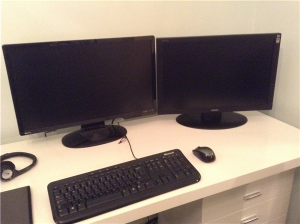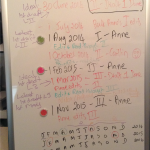The CFO from our agent’s company emailed the other day. Did either of us have ITINs?
“No, but we’ll find out how to get one,” we said, and went looking on the internet.
What is an ITIN?
An ITIN is an individual taxpayer identification number (ITIN). It’s used for people who pay tax in the US but are not eligible for a social security number. In Australian terminology, it’s a US tax file number for people who aren’t from the US.
We qualify as non-resident aliens, which is always nice if you write science fiction, don’t you think.
Why do we need one?
If you don’t have an ITIN the person paying your money (in this case the publisher) withholds 30% of the money and sends it to the US tax office, the Internal Revenue Service (IRS).
Australia does the same thing for non-Australian residents.
We could just write the 30% off as lost money. However, the tax treaty between US and Australia is very good. The tax rate for things like royalties is 5%. That’s means if we don’t get an ITIN we lose 25% of our income in unnecessary taxes. Add in agent fees and suddenly we’ve lost almost half our income.
Did we want an ITIN? Definitely.
What we need to apply for the ITIN
We determined fairly quickly that we need to fill out a W-7 form and send it away. For this we needed:
- A certified copy of our passport
- The tax treaty paragraph number
- An exception letter.
There’s a lot of information on the web about obtaining ITINs, but not a lot specifically about Australia.
The process for obtaining them had changed (just a little) over time, so there was conflicting information about what documentation was required, particularly with regard to what constituted identification. Some sites said you had to send the original passport, some said you could send a certified copy. Most sites said the certification had to come from the US embassy or a registered certification company. We weren’t sure which options were valid currently.
Also, on the internet a lot of the information applicable to writers had been written self-published authors, many of whom had opted for an EIN instead of an ITIN, because they were easier to get. This wasn’t applicable to us.
So we went hunting further. We called our own Department of Foreign Affairs and Trade (DFAT) first, then we called the US Internal Revenue Service (IRS).
We went through this process in May 2014.
Department of Foreign Affairs and Trade (DFAT)
We called DFAT first. They told us to ring the Passport Office – 13 1232 and choose option 0.
The Passport Office confirmed that they could do an apostille certificate for us, and gave us the address (including which floor) to go to, opening hours, etc.
Internal Revenue Service (IRS)
The number we called: +1 267 941 1000
Calling IRS is a lot like calling the ATO. You hold on the line for ages (27 minutes, in this case) until someone answers. You explain what you want. “I’ll just put you through to the appropriate department,” and you hold on the line for another 20 minutes.
A cultural aside here. Everyone at the IRS introduced themselves formally. “This is Mrs Brown”, “This is Ms Green”. I remember, when we first contacted our agent, we started out with ‘Dear Ms Blasdell’ because the advice on the internet recommended the formality. It wasn’t until a few emails in that we started using her first name. It actually felt strange, because here in Australia it would have been ‘Dear Caitlin’ right from the query, and the tax person would have introduced themselves as, “You’re talking to Yvette,” or similar.
Also, a tip. After they introduce themselves the consultant will give their ID. Be ready and write it down. We didn’t. We just wrote down the name. We got excellent service from the IRS person who answered our questions, so we went online and filled in a feedback form to say so. However, our consultant’s name is a common one so it’s hard to believe the feedback will get back to the right person.
The questions we asked
Do we need an ITIN
We were pretty sure we did, but it always pays to ask. The answer:
Yes.
For all the reasons given above.
Who can certify a passport?
We already knew we wanted to use our passports for proof-of-identity. Otherwise you need multiple documents.
We also knew that we needed a specific type of certification of the passport called an apostille. Our big question was, who would IRS would accept the apostille from? Some sites said only the IRS or a US embassy, some sites said IRS/US Embassy/approved people.
We knew that our own Department of Foreign Affairs and Trade (DFAT) could provide such a service. We just didn’t know if the IRS would accept it from DFAT.
The IRS consultant said certification could come from any one of:
The agency who issues the passport
IRS
US embassy
Certification acceptance agency
DFAT is the agency that issues Australian passports. So DFAT certification it was.
What proof do we have to provide and who can it be from?
Aside from the passport to prove who we were, we knew we also had to provide evidence that we were going to be paid US money. We didn’t know whether it had to be a letter from the publisher, or whether one from our agent would suffice. Or even if we could just wait until we got the contract and send them a copy of the contract.
The consultant said:
The letter must be from the person paying the money, not the person distributing it. That is, the publisher, not the agent. Furthermore, it has to contain specific information.
It must be on the company letterhead.
It must show your name. (Our name, in this case. One for Sherylyn, one for me.)
It must be signed.
Even better, she referred us to a document on the IRS website. Document number 1915—which for some reason we hadn’t seen in any of our ITIN searches, I don’t know why. She said:
There is a sample letter on page 35, showing what needs to be included.
Document 1915 is Understanding Your IRS Individual Taxpayer Identification Number ITIN. It covers pretty much everything you need to know to fill out the form.
Once we have our ITIN, do we need to lodge tax returns?
The answer to that was:
It depends on how much tax has been withheld.
She looked up the tax treaty and told us that the tax rate for royalties between Australia and the US is 5%. Thus
If you have been taxed more than 5% then yes, to get back the difference.
If we did have to lodge a tax return, what form should we use?
1040NR.
Do we still need to complete a W8-BEN?
Yes.
You must fill out the W8-BEN and send it to the payer of the income. Your ITIN should be included on that form.
The consultant was extremely helpful, and very patient. We Skyped the call, and the lag on the line was terrible. If you’ve ever watched the Eurovision song contest, the delay was about the same as the delay you see when they’re giving the scores. All up, the call took over an hour.
The one question we didn’t ask but wished we had was, “What is the treaty number?*” We know we can get this number from the web, but since the consultant looked it up to get the tax rate anyway, it would have been nice to have it confirmed.
Next steps
So far everyone has been extremely helpful.
Next steps are to:
- Get a certified copy of our passports
- Contact our agent to see about a letter from the publisher
- Get the right treaty number*
- Fill in the W-7 form (remembering to do dates in mm/dd/yyyy format)
- Send the whole thing away
- Wait at least eight weeks.
We’ll keep you posted on the process.
Update July 2014. We got our ITINs. It was relatively painless. Read all about it here.
* The question we should have been asking is what is our tax treaty paragraph number. Big difference. It’s all explained in part 2.


